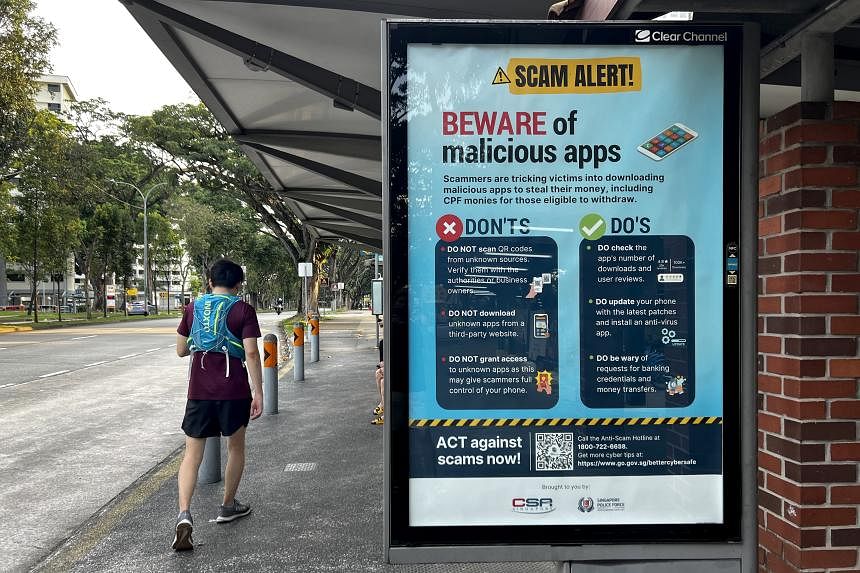SINGAPORE - Banks in Singapore should be required by law to fully reimburse scam victims, and in a timely manner without much hassle, said Workers’ Party (WP) chairman Sylvia Lim.
But Minister of State for Trade and Industry Alvin Tan said doing so could erode vigilance and personal responsibility, and lull users into complacency.
Ms Lim was making an adjournment motion speech in Parliament on Monday for the Government to do more to help scam victims.
She suggested the Government consider Britain’s move to force banks to compensate such victims from 2024.
This will apply except in cases where the customer was fraudulent or grossly negligent, or the transaction involved cryptocurrency or international payments.
Ms Lim noted that Australia was considering adopting similar measures.
The country’s financial services minister had said its government will ensure banks are accountable for much more.
Ms Lim added that the European Commission has also proposed refunding victims of authorised payment fraud in certain circumstances.
She called the current Monetary Authority of Singapore (MAS) approach of holding bank customers responsible for their proportion of the loss inadequate and unjust.
This is because consumers are not sufficiently equipped to combat scams, she said.
Ms Lim added that as banks are best positioned and the best resourced, they should take the lead in fighting scams.
She said: “Banks should take on an outsized role in preventing them. Banks are able to monitor transactions, block suspicious payment flows and keep abreast of the latest technological developments. Such endeavours are beyond the remit of most bank customers.”
She suggested mandatory reimbursements implemented here could cover all transfers between banks in Singapore via PayNow and Fast (Fast And Secure Transfers).
Ms Lim added: “Like the UK system, it could be scoped to protect customers who are consumers, small business and charities.
“This would give Singaporeans the confidence to transact using these methods without fear that their savings will be unknowingly siphoned off. It would also ensure that victims of these scams would be compensated in a timely manner without having to undergo a complex adjudication process.”
While Mr Tan noted that amounts lost in any single scam case can be substantial, he said a balance must be struck between fairness, accountability and compassion.
He added: “There are some views that banks can easily absorb losses arising from individual scam cases. However, full restitution without due consideration of culpability is neither fair nor desirable.”
He said customers have important responsibilities to protect access to their accounts, which include practising good cyber hygiene and being diligent in preventing their log-in information and one-time passwords from being divulged to third parties.
On Monday, Ms Lim also asked when the consultation paper on the equitable sharing of losses suffered by scam victims would be published, after the original publication date was pushed back by more than a year.
In February 2022, MAS said it planned to publish the framework on sharing liability for scam losses in the next three months.
But in July that year, MAS said the draft framework was delayed due to the complexity of the issues involved.
In May 2023, then Minister-in-charge of MAS Tharman Shanmugaratnam said in a written reply to a parliamentary question that the Government aimed to issue the public consultation paper in the third quarter of 2023.
Mr Tan said: “While this has taken longer than we would like, the Government aims to publish a consultation paper on the framework next month, focusing on phishing scams as a start.”
Ms Lim also called for more to be done to protect scam victims from unfair settlements with their banks, describing some banks’ goodwill payments as paltry compared with victims’ losses.
Such goodwill offers are usually tied to non-disclosure agreements, where a customer has to maintain absolute secrecy and forgo all rights to recover further sums.
Calling such agreements one-sided, she urged MAS to consider adopting regulatory guidelines in the settlement of consumer disputes.
Ms Lim also suggested reintroducing physical tokens as the default measure for two-factor authentication (2FA).
With most banks offering only digital tokens or SMS verification for 2FA, Ms Lim said the mobile phone becomes a single source of vulnerability. If the phone is infected with malware, this 2FA would be ineffective.
Mr Tan said customers can request a physical token, and added that MAS was looking into her suggestion.
Ms Lim asked the Government to consider implementing additional verification checks such as mandatory delays, transfer limits and additional authentication for transfers made to bank accounts of entities associated with cryptocurrencies, given the higher risks involved.
Mr Tan said MAS was monitoring the cryptocurrency space, and will regularly review its regulations.

